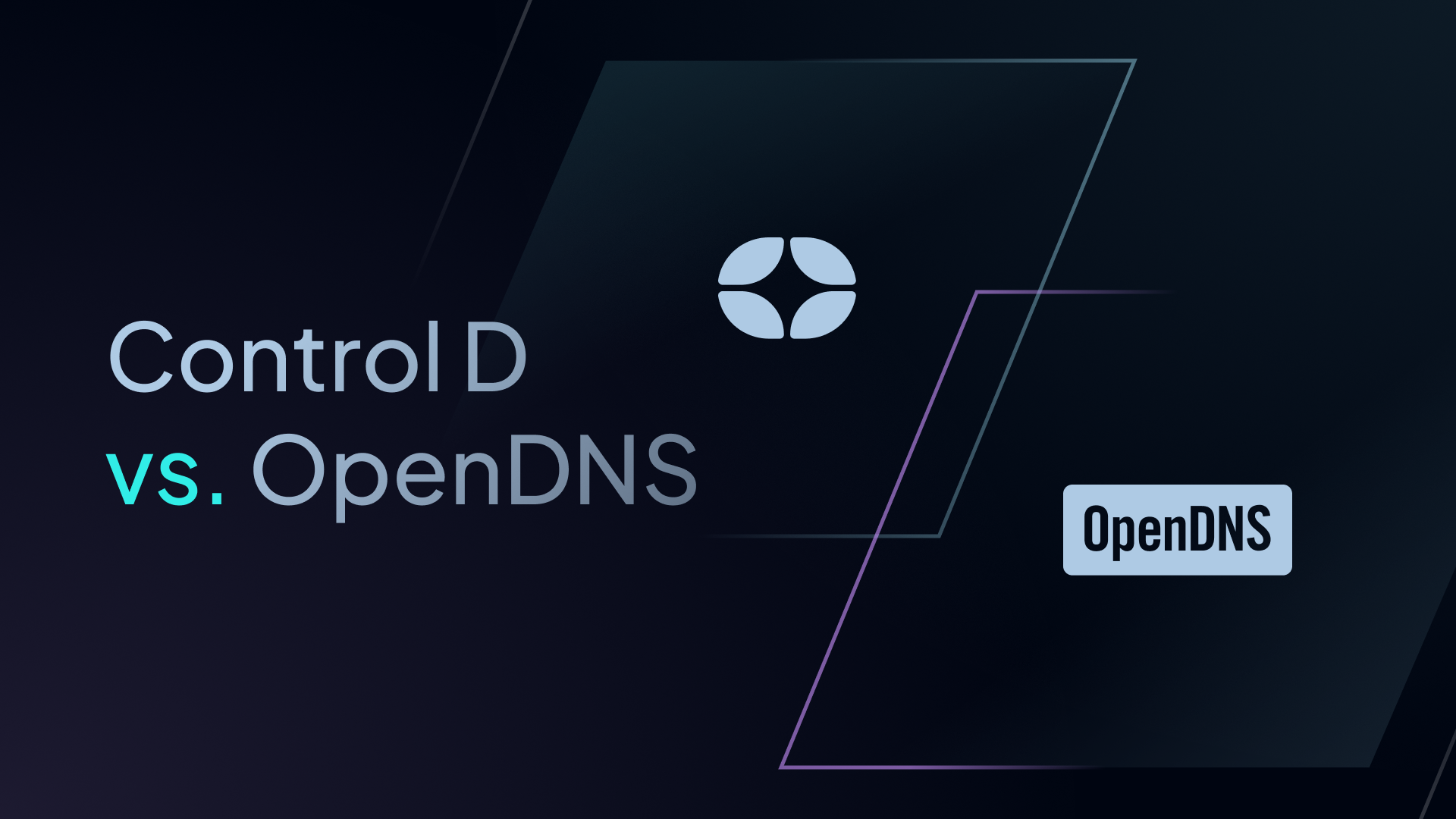OpenDNS, a widely recognized DNS service, was acquired by Cisco in 2015. While it continues to serve personal users under its original name, its business-focused services have been rebranded as Cisco Umbrella.
However, the enterprise service has seen a downturn in recent years, and with the end-of-life of the existing Cisco Roaming Client, users have been forced to switch to the new Secure Center, with some labeling the entire process a “mess.”
This article compares the business side of OpenDNS (Cisco Umbrella) against Control D, a modern, customizable DNS management solution.
Control D may not have the same brand recognition as Cisco, but it’s leading the charge in the DNS space, boasting a comprehensive feature set, quality customer support, and superior performance for a fraction of the cost of Umbrella.
We will analyze both services against the following criteria:
- Plans
- Pricing
- General Features
- Clients, Applications, and Integrations
- Analytics and Reporting
- Support
- Performance
Let’s jump in.
Plans
Cisco Umbrella has four main plans, each with more features than the last. Businesses can choose from:
- DNS Essentials
- DNS Advantage
- SIG Essentials
- SIG Advantage
There are also the Secure Access Essentials and Secure Access Advantage plans which build on SIG Advantage to add extra security tools like zero-trust access and network monitoring. However, these aren’t part of the core Umbrella offering. Instead they are part of the broader Security Service Edge (SSE) product package – which Umbrella is a subproduct of.
Having so many plans gives you options, but it also makes choosing the right one harder. Something to note is that many important features are only available in higher-tier plans, which come at a high cost – more on that later.
As such, you will likely need to talk to a sales rep to figure out which plan is best suited to your budget and needs. This prolongs the onboarding process even further since Cisco Umbrella is already notorious for having a steep learning curve – after all, it’s designed for large enterprises with huge IT teams.
Control D does things differently by giving every business the same full set of features from the beginning. There are no upgrades to worry about and no confusing plans to pick from – it’s also frequently applauded for its easy setup process.
You can sign up for a 30-day no-obligation demo (no credit card required) and start using it right away, without waiting for a sales call.
Pricing
Cisco Umbrella’s pricing structure is not disclosed to the public, meaning you’ll have to speak to a sales representative to discuss costs for each plan.
However, there are numerous reports online suggesting it is expensive, with some mentioning that per-user costs start at $2.50/month for the DNS Essentials plan and can go as high as $28/user/month for SIG Advantage and above. Considering Umbrella is targeted towards industry giants and MNEs, these reports may hold true, something that’s also validated by online reviews.
On the other hand, Control D has clear, transparent pricing which is based on organization type:
- Enterprise – $2/Endpoint/month
- MSP – $1/Endpoint/month
- School/Non-Profit – eligible for a further discounted rate
General Features
Blockable Services
When it comes to filtering which apps, websites, and platforms are accessible on your network, Control D and Umbrella offer different levels of control.
Control D provides a powerful feature called Services, allowing you to block, bypass, or redirect over 1,000 individual apps, tools, vendors, and websites with a simple toggle. This, combined with category-based filtering, allows you to fine-tune policies for particular clients, teams, or users.
For instance, you can block all Social Media sites by toggling on the Social Media Filter, and then navigating to the Services tab to allow specific apps and tools to resolve. Conversely, you can allow all Social Media sites to resolve, but block individual platforms.
Umbrella, on the other hand, offers a far smaller selection – fewer than 100 blockable Services. While this selection covers major platforms, it will not allow for precise control over less common tools.
Block Ads & Trackers
Ads and trackers load on virtually every website you access. Ads are not only distracting, but they can direct you toward malicious domains and hog resources, thus slowing down your page load times. At the same time, trackers impede privacy as they collect information on your browsing habits, creating a digital fingerprint that can be used to identify you.
Control D makes blocking them easy by offering a built-in ad and tracker blocking feature, capable of filtering out advertising domains and networks, tracking services, and data collectors at the DNS level. This means fewer intrusive ads and reduced tracking across websites without the need for extra software or browser extensions.
There are three block modes to choose from: Relaxed, Balanced, and Strict.
Cisco Umbrella, on the other hand, does not offer dedicated ad or tracker blocking, meaning you may still experience unwanted ads, data collection, and slower load times.
Traffic Redirection
Control D offers a powerful feature called Traffic Redirection, which allows you to route DNS traffic through proxy servers in over 100 exit locations across 60+ countries.
This feature gives you the flexibility to route all DNS traffic through a default location or apply redirection to specific Services for granular control over how and where your DNS traffic is routed.
Umbrella does not offer this capability.
Advanced Geo-Custom Rules
Control D offers Advanced Geo-Custom Rules, which allows you to block, redirect, or bypass DNS queries based on their geographic origin or destination. This means you can enforce rules on queries made from specific IP addresses, queries resolving to certain countries, or even those tied to particular Autonomous System Numbers (ASNs).
For example, you can block access to domains resolving to, or from, IPs in high-risk regions like China or Russia, bypass restrictions for trusted locations, or redirect traffic from a specific ASN through a proxy location for added security.
Meanwhile, Cisco Umbrella only offers basic Geo-IP blocking, which provides a blanket country-wide blocking approach. But, it lacks the flexibility to fine-tune rules at the ASN level or redirect queries.
👉 Learn more about Geo-Custom Rules, its benefits, and how to enforce them
Remote Browser Isolation (RBI)
Umbrella offers Remote Browser Isolation as an add-on for SIG Essentials and up. This feature creates a remote browser session that acts as a barrier between your device and potentially harmful web content, reducing the risk of malware or phishing attacks.
Control D does not currently offer this feature.
Clients, Applications, and Integrations
There’s not much in it between Control D and Umbrella, with both offering desktop and mobile support, Single Sign-On capabilities, RMM tool integration, and full API access. The only notable difference is that Umbrella is not compatible with Linux devices, which Control D is.
Linux is a growing operating system among software engineers, business professionals, and personal users. If you require a solution with full-device compatibility, then Control D will be better suited to your needs.
Analytics and Reporting
Query Log & Report Retention
Cisco stores query log data for up to 30 days and allows you to generate reports as far back as the previous year.
On the flip side, Control D stores raw query log data for 7 days but offers two versions of reports. You can either generate a report for the previous 30 days with hourly time series granularity or the last year with daily time series granularity.
Data Storage Regions
Control D offers three data storage regions by default: North America, Europe, and Australia. If you require a custom data storage region due to compliance or operational needs, Control D can facilitate this for an additional fee.
Umbrella offers two data storage regions by default – North America and Europe – but does not provide the ability to arrange a custom region.
Support
Quality of Support Received
Customer support can make or break your experience, especially when dealing with critical network issues. Having access to reliable support is essential for businesses that rely on fast resolutions to keep operations running smoothly.
Umbrella has been frequently criticized for its shortcomings in this department. Many users report difficulties in reaching a knowledgeable support agent, with some stating that their queries were ignored or left unresolved completely.
Control D, on the other hand, has consistently received positive feedback for its responsive and knowledgeable support team. While there is a guaranteed response time of 24 hours, it’s not uncommon to receive a reply in as little as a few.
Additionally, many of the support queries are tackled by the engineers themselves, ensuring your problem is resolved swiftly with in-depth explanations on how to avoid similar issues in the future.
Chat Support
Control D offers real-time chat support in the form of Barry, an intelligent AI chatbot designed to assist with any and all queries. Barry pulls from Control D’s extensive documentation and team expertise to answer 99% of queries instantly.
If Barry can’t solve your issue and you need a human’s help, he can quickly escalate your question to a human support agent directly within the chat.
On the other hand, Cisco Umbrella, does not provide chat support at all. If you require assistance, you’ll need to rely on traditional methods like email, which can lead to longer wait times.
👉 Find out more about Barry and his capabilities
Prioritized Support
A feature offered by Cisco Umbrella is 24x7 software support, which is provided over email or phone. However, this is offered as a purchasable add-on, which can increase per-month costs further.
Besides utilizing Barry, Control D does not provide 24x7 support.
Performance
All data used in this section has been sourced from DNSPerf.
Latency
Control D ranks fifth in Performance with a DNS query speed of 16.06 ms, whereas Cisco Umbrella ranks sixth with a speed of 19.66 ms.
Uptime
Control D has a more consistent Uptime of 99.91% compared to Cisco Umbrella, which comes in last with a score of 98.30%
Quality
Control D outshines Cisco Umbrella in the Quality metric with a score of 99.91% compared to 98.27%.
Final Thoughts
Both Control D and Cisco Umbrella provide DNS-based security and filtering, but they take different approaches to achieving these goals. Umbrella relies on its brand name of OpenDNS and Cisco to hook you in but can be underwhelming with a limited feature set, confusing onboarding, and lackluster post-sales support.
On the other hand, Control D relies on its functionality to offer a greater number of features with granular customizability and flexibility, a smoother user experience, responsive customer support, and better performance.



